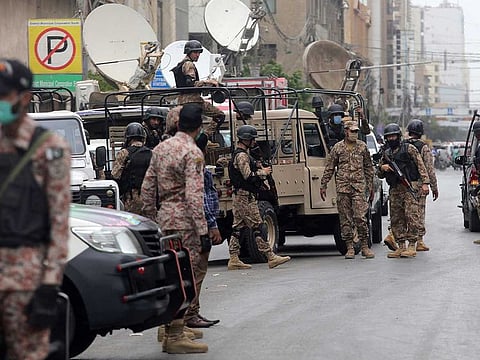Strict law: Pakistan restores preventive detention powers in Anti-Terror Law
Amendment allows up to 90-day custody of suspects without formal charges

Dubai: The Pakistan Senate on Tuesday passed the Anti-Terrorism (Amendment) Bill, 2025, restoring controversial powers for law enforcement agencies and the armed forces to detain suspects for up to three months without formal charges.
The bill, already cleared by the National Assembly last week, amends a section of the Anti-Terrorism Act, 1997, which previously lost its force when earlier amendments expired.
Under the revised law, the federal government or armed forces acting under government orders may issue detention orders against anyone suspected of involvement in terrorism, extortion, kidnapping for ransom, or activities threatening national security.
The provision enables preventive detention based on “credible information or reasonable suspicion,” allowing authorities to disrupt potential plots before they materialise.
Legal safeguards
The amendment requires that a detainee be produced before a magistrate within 24 hours of arrest. Any detention beyond the three-month period must conform to protections enshrined in Article 10 of the Constitution, which safeguards against arbitrary arrest. Investigations will be carried out by Joint Investigation Teams (JITs) made up of police, intelligence agencies, and civil armed forces, and must be supervised by an officer not below the rank of Superintendent of Police.
Law Minister Azam Nazeer Tarar assured lawmakers that the amendment had already withstood judicial scrutiny and was consistent with constitutional principles. To address concerns of unchecked state power, the government inserted a three-year “sunset clause”, after which the special detention powers will automatically lapse unless renewed by Parliament.
Support and opposition in Senate
Government lawmakers argued the amendment was necessary to confront a resurgent wave of militant violence. “We cannot allow terrorists to roam freely while innocent people are slaughtered in provinces, on trains like the Jaffar Express, or in targeted attacks,” said PML-N Senator Irfan Siddiqui, warning against leniency in the face of militancy that has cost Pakistan nearly 100,000 lives.
The bill’s statement of objects and reasons echoed that sentiment, stressing that Pakistan’s “current security situation requires a robust response” beyond existing legal tools, and that empowering law enforcement would ensure effective, intelligence-led operations.
But opposition voices expressed alarm. JUI-F Senator Kamran Murtaza attempted to move amendments to restrict detention powers, warning of possible misuse for political victimisation and enforced disappearances. His proposals were rejected by a majority vote.
Wider legislative agenda
Alongside the Anti-Terrorism amendment, the Senate also passed two other bills: the Pakistan Land Port Authority Bill, 2025, aimed at regulating cross-border trade, and the Petroleum (Amendment) Bill, 2025, moved by Petroleum Minister Ali Pervaiz Malik.
Looking Ahead
While the government insists the strengthened law will improve counterterrorism operations and intelligence coordination, critics remain divided over whether the safeguards including judicial oversight and the sunset clause will be sufficient to prevent misuse.
For now, the legislation marks a significant shift in Pakistan’s counterterrorism framework, rearming the state with sweeping detention powers last wielded at the height of its fight against militancy.
Sign up for the Daily Briefing
Get the latest news and updates straight to your inbox




